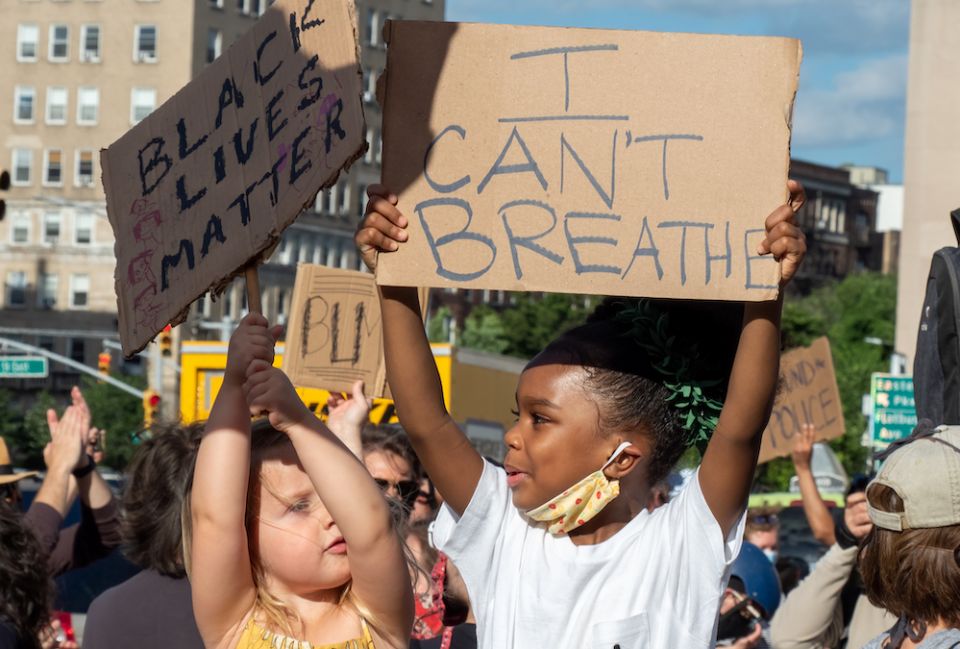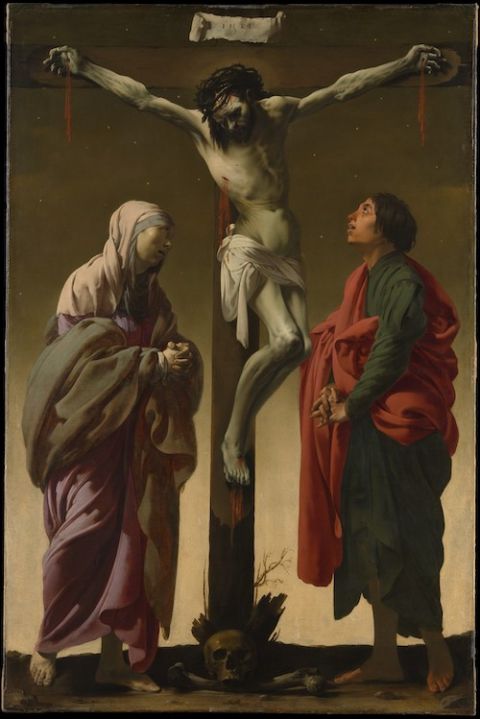BLM Floyd protest c.jpg

Every day when I pray, I center on my breath. For about an hour, I breathe in and breathe out … as the years go by, I understand that breath is life and life is holy. Sometimes breathing feels like being anointed with oils of gladness, sometimes like receding waves of darkness into depthlessness.
I suffer from asthma and it is very important that when I have attacks, I consciously breathe deeply and calmly so that soon the episode is over. When I panic or am chased by a dog or simply in disequilibrium, my breath, my prayer, always comes to my rescue. Breath is my lifeline, prayer my daily bread.
That is why when I learned that George Floyd could not breathe for 8 minutes and 46 seconds before he died, I literally choked. I wondered if he panicked, or simply fell into receding waves of darkness and so into the light? I even asked him, "George, when you cried out: 'Mama' and again, 'Mama,' was that a prayer on your last breath?" Until now I mourn George — a fellow human being who, like me, also needed his breath to live, and is now gone — until I meet him face-to-face.
Our breath is not our own — it is God breathing life in us (Genesis 2:7). We cannot dispose of it, deny it to anyone even for a moment and certainly not for 8 minutes and 46 seconds! What shall I say when God asks me, "Where is your brother?" (Genesis 4:9).
Just as Jesus uttered Seven Last Words when hanging on the cross, George Floyd also had his Last Words while choking under an officer's knee. Among them were:
Sir
Please
I cannot breathe (at least 16 times)
Water
Mama
Don't kill me … I'm about to die …
Everything hurts … Mama
How polite he was, George. How courteous! Asking for his life, "Please … I cannot breathe," he remained gentle. Sometimes in prayer, we too realize that we desire something so badly, akin to our need for air so that we can breathe. We ask, "Please," hoping that someone is listening. Just like my little grandniece "knows" that when she pleads with her little hands, knocking outside her parents' bedroom door, the door will open.
Oh, George, the door must have opened for you; otherwise, why these global upheavals carried out in your name? Our hearts break when we are ignored and receive no answer, but the hearts you have inspired have been made even stronger, more creative to challenge the world's status quo. Have you seen all those global rallies, sensed the shifts in consciousness and watched the polls turn more positive for change? You must have been so proud of your brother, Philonise, when he testified before Congress, his silences more eloquent than the words he could speak.
Advertisement
Advertisement
Another Scripture (Isaiah 57:7-10) reminds me of George's death:
He was oppressed, and he was afflicted,
yet he did not open his mouth;
like a lamb that is led to the slaughter …
so he did not open his mouth.
By a perversion of justice he was taken away …
he shall see his offspring, and shall prolong his days;
through him the will of our God shall prosper.
I wonder: What is God revealing to us in George? Was the presence of God transforming George Floyd and allowing him to remain totally human even while we tried to make him "a worm, and no man?" (Psalm 22:7).
Catching his breath, gasping for air, George like Jesus also asked for water. When was the last time I offered someone something so basic as water? How do we remain meek, like George, like Jesus, like our sisters and brothers of color who for centuries have absorbed into their minds and hearts, lives and culture, extremes of inequality so that violence seems to be the one and only, necessary and logical, response?
When George Floyd cried out for his mother because everything hurt: his stomach, his neck, his lungs that could not breathe; when he begged not to be killed, moaned that he was dying; he was echoing every created being's primal cry for the One to whom everyone and everything belongs and who wants everyone and everything to be alive and safe. George, crying out for life and breath, was one with John of the Cross and the mystics:
Where have you hidden
Beloved, and left me moaning?
I went out calling you, and you were
Gone.
Brugghen crucifixion cc.jpg

From the moment we are born and our eyes search for our significant other (usually, our mother's eyes or voice or touch), we have begun our search, our longing, our cry for the One with whom we are so intimately connected and without whom we perish. That's what I thought when George cried out Mama … I too still cry for Ma when I am hurt. I too want to be buried near her. George and I are simply reaching out for the One with whom we feel safe and free to be ourselves.
Every cry for equality and freedom, for healing, for courage and strength, food, shelter, water, understanding, forgiveness, security, affection, deliverance — all these cries for human flourishing are God's desires for us as well, and meant to be fulfilled. How can we not listen to the cries of generations and generations of African Americans who still do not have an equal place in their own country, their own country who bought and sold them as slaves and kept them segregated in classrooms, toilets, armies and everywhere else?
We cannot continue to "kick against the goad" (Acts 26:14). We cannot continue kicking ourselves — we only hurt ourselves doing that because, dehumanized, we are not able to remember that we all make up Christ's body. Rather, we limit ourselves with our own eyes, our own perspective of who we are, our own self-worth. Christ's body, however, beaten up, kicked against, spat upon, abused and bloodied, was blessed and broken, given up for us that we might have life. That is how Jesus asked us to remember him, and at Eucharist, that is what is asked of us: "Do this in remembrance of me." We are a people responsible to and for one another before God and all of creation. Responsible to feed one another and responsible to become what we feed and nourish one another.
And so, tell me, how will we ever be able to participate in the next Eucharist, and the next, and the next, without remembering George Floyd and Breonna Taylor, Ahmaud Arbery and Trayvon Martin, Emmett Till, and the next and the next and the next human being killed because of the color of their skin? Are they not like Jesus, the beloved of the Father? Their bruised and broken bodies, black and lynched and gunned down, spat upon, are they not the body of Christ, seated at the right hand of God, interceding for us all?
Mercy upon mercy upon mercy!
[Mary Edith Olaguer is a Sister of the Good Shepherd who belongs to the contemplative branch of the congregation. Originally from the Philippines, she completed a graduate degree in theology in Windsor, Canada, and now lives in Wolcott, Connecticut. From a very early age, she has always been drawn to God as Presence, and as a contemplative Sister of the Good Shepherd, with the congregation’s charism for the disenfranchised and excluded, her prayer has evolved into a one-ing with the world-God-so-loves.]
Like what you're reading? Sign up for GSR e-newsletters!

